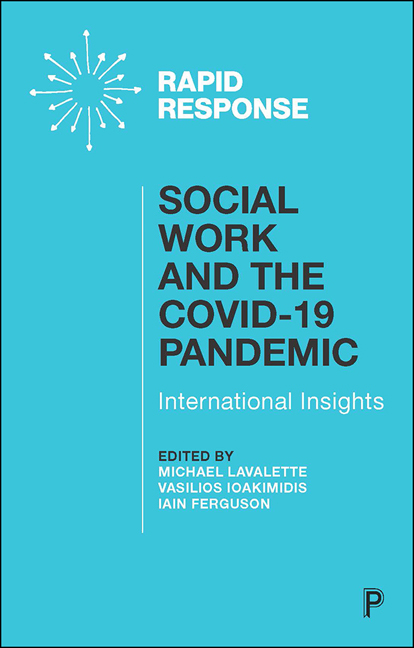9 - Social Services, Social Work and COVID-19 in Palestine
Published online by Cambridge University Press: 23 March 2021
Summary
Introduction
Since the outbreak of coronavirus (COVID-19) in the world, societies have taken unprecedented protection procedures in terms of prevention and compliance with health procedures that have been announced by the World Health Organization. The commitment of these procedures and policies varies between countries, some have been keen to follow the procedures in a rigorous and serious way, while others have delayed following the recommended preventative procedures, with a tendency towards heavy loss of life.
In Palestine, the virus appeared in Bethlehem city on 5 March and has since spread all over Palestine. It was necessary to start work on creating and raising awareness, providing protection advice and helping and supporting affected families. The individual and community interventions varied between governorates (cities, villages and camps), with interventions taking many forms of social solidarity.
A special fund was established in Palestine to meet the economic, health and social effects of coronavirus. Community and official emergency committees were formed to deal with the procedures issued by the Palestinian National Authority through different bodies and official spokesmen from the government. All the interventions, donations, charitable works and aid were associated with these committees.
On the level of individual and collective behaviour, there was indifference among large segments of the Palestinians. This was evident through citizens’ behaviour and the lack of commitment to public safety procedures in accordance with Palestinian government instructions and not taking into consideration the risk of virus spreading.
In Palestine, institutions, ministries and schools were closed as (128,2054) male and female students were deprived of education and they were deprived of their education. Universities, mosques and churches were also closed, and many people were stuck in different countries and not able to return home for four months until the initial phase of the crisis subdued.
Palestinians fears increased toward their detained children and toward prisoners in general. Also, the economic hardship of the Palestinians increased because factories were closed and many workers were not able to work inside the occupied territories.
This situation created psychological, social, economic and cultural repercussions for society, and many families have been quarantined. This caused a sense of boredom, anxiety and fear among all categories, especially among children.
- Type
- Chapter
- Information
- Social Work and the COVID-19 PandemicInternational Insights, pp. 65 - 72Publisher: Bristol University PressPrint publication year: 2020



